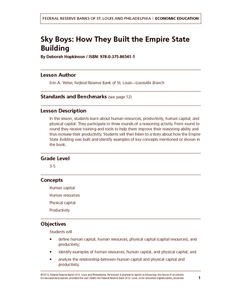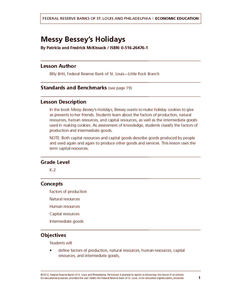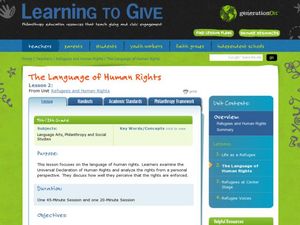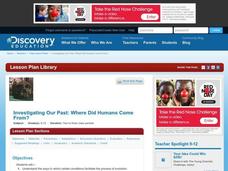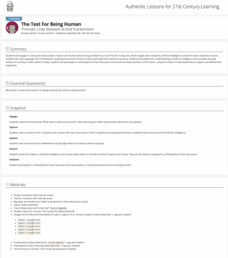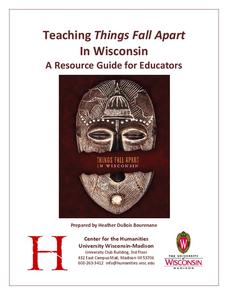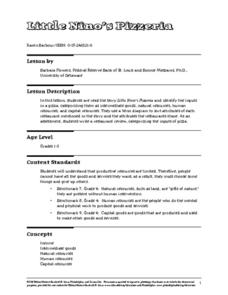Curated OER
Lemonade For Sale
2-3rd graders listen to the story, Lemonade for Sale, by Stuart J. Murphy. In the story, children produce and sell lemonade to raise money for their clubhouse, create a product, classify the resources used in production as natural...
Curated OER
The Human Body
Explore the human body through hands-on activities. Young learners will trace their bodies and place cut out body organs in the proper place, print patterns using cut fruit, sing songs about good nutrition, and use their five senses...
Curated OER
Lesson Plan: Humans and the Land
Art acts as inspiration for a conversation about human impact on the environment and creative writing. The class examines three pieces, looking for evidence of human impact on the landscape. They then write a first-person narrative, from...
Federal Reserve Bank
Sky Boys: How They Built the Empire State Building
How tall is the Empire State Building? Lead your class through a collaborative estimation activity to determine the number of quarters it would take to reach the top and teach the following concepts: human capital, human resources,...
Federal Reserve Bank
Messy Bessey's Holidays
Teach your class some fairly complex terms—factors of production, human resources, capital resources, natural resources, and intermediate goods—with a storybook (Messy Bessey's Holidays), plenty of visuals and handouts, and related...
Stanford University
Observing Human Rights Day
How much intervention is appropriate for America to take in cases of human rights violations? Class members ponder a question that has lingered since the birth of America with a series of primary sources that reflect the degree to which...
Curated OER
Ego Trip- Exploring the Inner Workings of the Human Body
Students gain an understanding of how systems and organs in the human body work. They create their own fictional account of a trip through the human body, and describe one response the body makes to stimuli.
Stanford University
Civil Rights or Human Rights?
Young citizens consider the American civil rights movement as part of the global struggle for human rights. After using a timeline activity to learn about the major events in the civil rights movement, class members study Malcolm X's...
Curated OER
The Language of Human Rights
Did you know that there are 15.2 million refugees in the world? High schoolers will read "The Universal Declaration of Human Rights" and learn how they can get involved to lower this surprising number. To really encourage involvement,...
Curated OER
Human Body Corp.
Learners investigate body systems by participating in a role-play activity. Third, fourth, and fifth graders pretend that they are an organ or system of the human body, and they must write a letter to the body "corporation" discussing...
Curated OER
Investigating Our Past: Where Did Humans Come From?
Investigate the theories of human evolution. In this research based lesson, learners research and discuss how geographic isolation, interbreeding, generalization, and specialization are factors in the history of humans. Groups work...
K12 Reader
Natural Resources
What natural resources are available in your area? Your learners can consider this question after reading a brief passage about natural and renewable resources. After reading, class members respond to five questions related to the reading.
Council for Economic Education
Out of Africa: Why Early Humans Settled around the World
Why would someone want to leave home? The age-old question is at the center of a thought-provoking activity. Scholars consider why humans move around the world both during pre-historical times and today using a PowerPoint, reading on...
Core Knowledge Foundation
The Human Body—Building Blocks and Nutrition Tell It Again!™ Read-Aloud Anthology
A read-aloud anthology explores the human body. Over three weeks, second graders listen to and discuss texts related to the cells, tissue, organs, digestive system, excretory system, nutrients, and a balanced diet. Learners practice word...
Core Knowledge Foundation
The Human Body Tell It Again!™ Read-Aloud Anthology
A read-aloud anthology showcases various stories about the human body. Scholars participate in lessons that introduce a reading, listen to and discuss the reading, then complete in-class and at-home practice.
K20 LEARN
The Test for Being Human: Thematic Links Between AI and Frankenstein
"It's alive!" Or is it? Scholars tackle the question of what it means to be human in a lesson that asks them to research the Turning Test and other devices that attempt to prove whether AI devices can pass as humans. After participants...
Curated OER
Animals and Humans
Students identify the functions of various body parts. They participate in the "Head, Shoulders, Knees, and Toes" song, draw a picture of themselves and other mammals, and create a traced outline of their body that they add features to....
Curated OER
Human Rights
High schoolers read the Universal Declaration of Human Rights and then research countries which have had human right violations.
Curated OER
Natural Resources and Ancient Cities
Students explain how the availability of natural resources has affected human settlement patterns. They recognize the interactions of human populations on environments and compare the growth of two ancient cities in relation to natural...
PBS
Universal Declaration of Human Rights
What rights are guaranteed to students? Do they align with the Universal Declaration of Human Rights, which was approved by the United Nations in 1948? Middle and high schoolers present persuasive arguments about the rights they believe...
University of Wisconsin
Teaching Things Fall Apart in Wisconsin: A Resource Guide for Educators
“There is no story that is not true, . . .” And uncovering the truths in Things Fall Apart is the focus of a 68-page resource packet designed to provide instructors with a wealth of materials that enhance understanding of Chinua Achebe’s...
Advocates for Human Rights
Human Rights in the U.S.
Here's a fun, creative approach to the profoundly important issue of human rights. Young citizens do three activities, two of which involve them finding images from magazines that reflect human rights of their choosing and creating a...
Federal Reserve Bank
Little Nino's Pizzeria
Engage your youngsters in basic economics by connecting the terms to dessert and pizza! After a discussion about intermediate goods and natural resources, learners read and connect a pizzeria to economic terms.
Curated OER
Lesson: Differing World Views: Human and Animals
Kids challenge their understanding of the world around them and consider the impact man has on the environment and animal life. They examine a Tlingit piece, read two Tlingit stories about man and animals, then participate in a research...
Other popular searches
- Human Resources Management
- Human Resources Jeans
- Natural and Human Resources
- Pictures of Human Resources
- Business Human Resources
- Human Resources Department
- Human Resources 2nd Gradwe
- Human Resources 2nd Grad We
- Human Resources Lesson Plan
- Southwest Asia Human Resources





